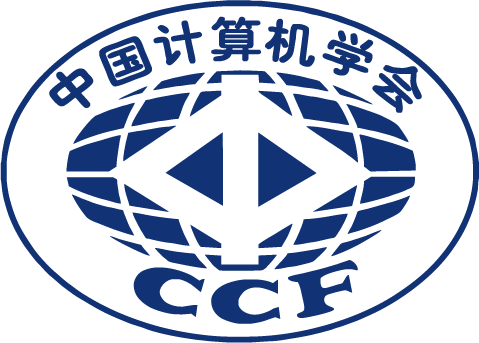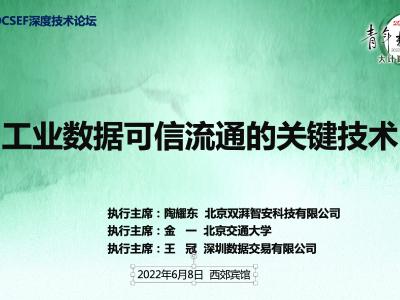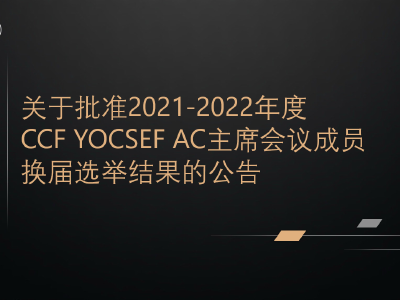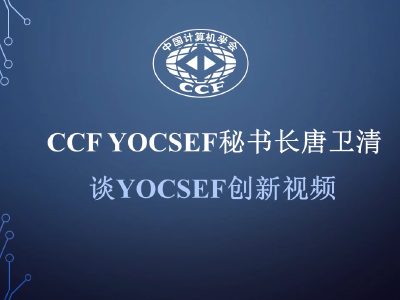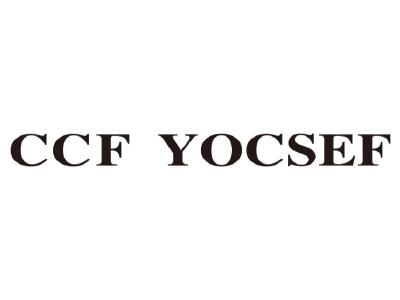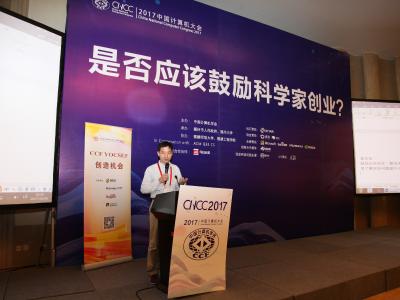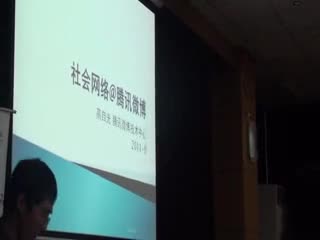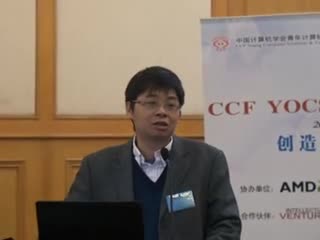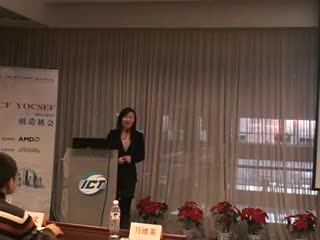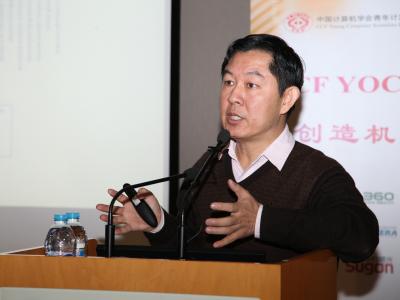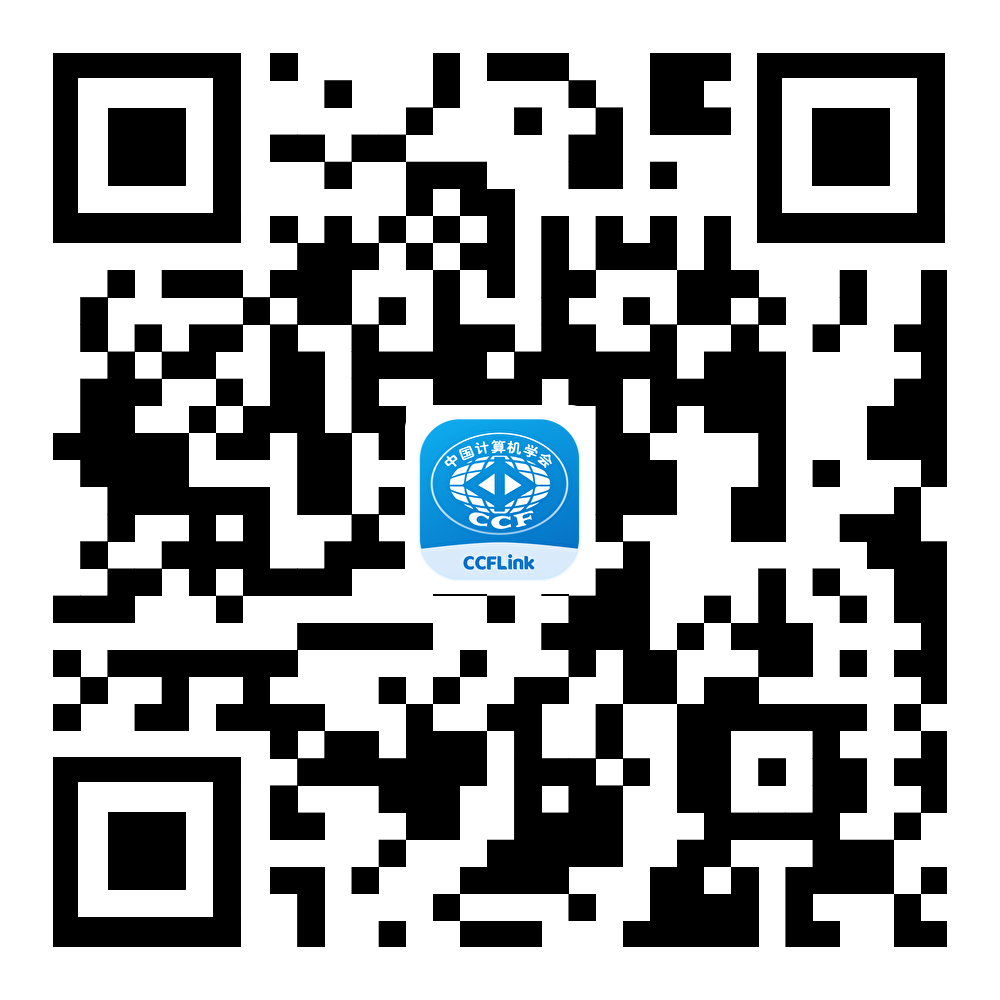中国计算机学会青年计算机科技论坛
CCF Young Computer Scientists & Engineers Forum
CCF长沙 CCF YOCSEF长沙
联合论坛
于2017年8月20日(星期日) 上午9:00-12:00
湖南.长沙 中南大学 科教楼一会议室
举行专题报告会,敬请光临
报告会主题
数据传感、处理与通信新技术论坛
随着电子技术的发展,人类感知能力已经延伸到各个角落,无处不在,几乎可以完整地记录整个物理世界和社会运行。强大的数据传感采集能力日益满足人们不断广泛的应用需求,尤其是移动互联网的发展,通过智慧地球、智慧城市、智慧家庭、智慧电网、智慧农场、智慧交通、智慧工厂等系列的数据感知、通信传输、处理、管理与应用等过程使得人类开始进入万物互联的智慧生活的时代。然而随着传感采集数据不断增大、边缘通信带宽不断增加、数据形式日益多样、数据的关联日益复杂,用户的规模不断上升,所有这些都对数据传感、数据存储管理、数据高效处理、高通量通信、以及新型的计算模式都提出了巨大的挑战。
学术界和工业界都为有效化解这些挑战不遗余力地将技术不断向前推进,承载网络从1G、2G、3G、4G现在正在推进5G,计算形式由大型机计算、网格计算、云计算/数据中心计算等形式开始形成移动边缘计算范式,终端接入的形式和种类多样适应各种不同场景。技术日新月异,我们又将面临怎样的新挑战,技术又将走向何方?湖南省数据传感与交换设备工程中心依托中南大学信息科学与工程学院和湖南恒茂高科股份有限公司联合举办本次论坛,邀请到学界四位专家从不同的角度介绍探讨相应技术演进的机遇、挑战与最新进展。
承办单位:中南大学信息科学与工程学院
湖南省数据传感与交换设备工程中心
专题报告会程序
8月20日上午
08:30-09:00 入场签到(中南大学科教楼一会议室)
09:00-09:05 中南大学信息科学与工程学院院长 邹北骥教授致欢迎辞
09:05-09:10 湖南省数据传感与交换设备工程中心管委会主任 郭敏董事长致辞
09:10-09:50 特邀报告
特邀讲者:Kato教授日本东北大学
演讲题目:The Deep Learning Vision for Heterogeneous Network Traffic Control: Proposal, Challenges, and Future Perspective
09:50-10:30 特邀讲者:曹建农教授 香港理工大学计算机系
演讲题目:Data-driven Design of Wireless Networks
10:30-10:50 合影+茶歇
10:50-11:20 特邀讲者:李东升教授 国防科技大学计算机学院
演讲题目:数据中心网络流调度技术
11:20-11:50 特邀讲者:肖 亮教授 厦门大学信息科学与工程学院
演讲题目:基于强化学习的移动数据卸载抗智能攻击技术
执行主席:邓晓衡 博士/教授 中南大学信息科学与工程学院
CCF长沙执委
执行主席:任 炬 博士/教授 中南大学信息科学与工程学院特聘教授
CCF YOCSEF长沙分论坛委员
执行主席:张 锦 博士/教授 湖南师范大学数学与计算机学院
CCF长沙秘书长
执行主席:邝祝芳 博士/副教授 中南林业科技大学计算机与信息工程学院
CCF YOCSEF长沙分论坛学术秘书
注:①CCF会员免费参加,往返交通费和住宿自理
②尚未加入CCF的参会人员,欢迎参会期间加入CCF,并同时加入所在城市的CCF YOCSEF
③联系人及电话:邓晓衡(13337218597)、邝祝芳(13517473370)
④请参会人员于8月18日前将参会回执(如表1)发E-mail至dxh@csu.edu.cn
表1. 参会回执单
|
姓名
|
工作单位
|
职务/职称
|
手机
|
Email
|
CCF会员号
|
|
|
|
|
|
|
|

图1. 会场方位图
附一:特邀报告内容和报告人简介
特邀讲者:Nei Kato 教授
 Nei Kato is a full professor and the Director of Research Organization of Electrical Communication(ROEC), Tohoku University, Japan. He has been engaged in research on computer networking, wireless mobile communications, satellite communications, ad hoc & sensor & mesh networks, smart grid, IoT, Big Data, and pattern recognition. He has published more than 350 papers in prestigious peer-reviewed journals and conferences. He is the Vice-President-Elect(Member & Global Activities) of IEEE Communications Society(2018-2019), the Editor-in-Chief of IEEE Network Magazine(2015-2017), the Editor-in-Chief of IEEE Transactions on Vehicular Technology(2017-), the Associate Editor-in-Chief of IEEE Internet of Things Journal(2013-), and the Chair of IEEE Communications Society Sendai Chapter. He served as a Member-at-Large on the Board of Governors, IEEE Communications Society(2014-2016), a Vice Chair of Fellow Committee of IEEE Computer Society(2016), a member of IEEE Computer Society Award Committee(2015-2016) and IEEE Communications Society Award Committee(2015-2017). He has also served as the Chair of Satellite and Space Communications Technical Committee(2010-2012) and Ad Hoc & Sensor Networks Technical Committee(2014-2015) of IEEE Communications Society. His awards include Minoru Ishida Foundation Research Encouragement Prize(2003), Distinguished Contributions to Satellite Communications Award from the IEEE Communications Society, Satellite and Space Communications Technical Committee(2005), the FUNAI information Science Award(2007), the TELCOM System Technology Award from Foundation for Electrical Communications Diffusion(2008), the IEICE Network System Research Award(2009), the IEICE Satellite Communications Research Award(2011), the KDDI Foundation Excellent Research Award(2012), IEICE Communications Society Distinguished Service Award(2012), IEICE Communications Society Best Paper Award(2012), Distinguished Contributions to Disaster-resilient Networks R&D Award from Ministry of Internal Affairs and Communications, Japan(2014), Outstanding Service and Leadership Recognition Award 2016 from IEEE Communications Society Ad Hoc & Sensor Networks Technical Committee, Radio Achievements Award from Ministry of Internal Affairs and Communications, Japan (2016) and Best Paper Awards from IEEE ICC/GLOBECOM/WCNC/VTC. Nei Kato is a Distinguished Lecturer of IEEE Communications Society and Vehicular Technology Society. He is a fellow of IEEE and IEICE.
Nei Kato is a full professor and the Director of Research Organization of Electrical Communication(ROEC), Tohoku University, Japan. He has been engaged in research on computer networking, wireless mobile communications, satellite communications, ad hoc & sensor & mesh networks, smart grid, IoT, Big Data, and pattern recognition. He has published more than 350 papers in prestigious peer-reviewed journals and conferences. He is the Vice-President-Elect(Member & Global Activities) of IEEE Communications Society(2018-2019), the Editor-in-Chief of IEEE Network Magazine(2015-2017), the Editor-in-Chief of IEEE Transactions on Vehicular Technology(2017-), the Associate Editor-in-Chief of IEEE Internet of Things Journal(2013-), and the Chair of IEEE Communications Society Sendai Chapter. He served as a Member-at-Large on the Board of Governors, IEEE Communications Society(2014-2016), a Vice Chair of Fellow Committee of IEEE Computer Society(2016), a member of IEEE Computer Society Award Committee(2015-2016) and IEEE Communications Society Award Committee(2015-2017). He has also served as the Chair of Satellite and Space Communications Technical Committee(2010-2012) and Ad Hoc & Sensor Networks Technical Committee(2014-2015) of IEEE Communications Society. His awards include Minoru Ishida Foundation Research Encouragement Prize(2003), Distinguished Contributions to Satellite Communications Award from the IEEE Communications Society, Satellite and Space Communications Technical Committee(2005), the FUNAI information Science Award(2007), the TELCOM System Technology Award from Foundation for Electrical Communications Diffusion(2008), the IEICE Network System Research Award(2009), the IEICE Satellite Communications Research Award(2011), the KDDI Foundation Excellent Research Award(2012), IEICE Communications Society Distinguished Service Award(2012), IEICE Communications Society Best Paper Award(2012), Distinguished Contributions to Disaster-resilient Networks R&D Award from Ministry of Internal Affairs and Communications, Japan(2014), Outstanding Service and Leadership Recognition Award 2016 from IEEE Communications Society Ad Hoc & Sensor Networks Technical Committee, Radio Achievements Award from Ministry of Internal Affairs and Communications, Japan (2016) and Best Paper Awards from IEEE ICC/GLOBECOM/WCNC/VTC. Nei Kato is a Distinguished Lecturer of IEEE Communications Society and Vehicular Technology Society. He is a fellow of IEEE and IEICE.报告题目:深度学习视角的异构网络流量控制:问题,挑战与未来展望
Recently, deep learning, an emerging machine learning technique, is garnering a lot of research attention in several computer science areas. However, to the best of our knowledge, its application to improve heterogeneous network traffic control which is an important and challenging area for IoT by its own merit has yet to appear because of the difficult challenge in characterizing the appropriate input and output patterns for a deep learning system to correctly reflect the highly dynamic nature of large-scale heterogeneous networks. In this talk, an appropriate input and output characterizations of heterogeneous network traffic will be introduced and a supervised deep neural network system will be proposed. I will describe how our proposed system works and how it differs from traditional neural networks. Also, preliminary results will be discussed and I will demonstrate the encouraging performance of our proposed deep learning system compared to a benchmark routing strategy (Open Shortest Path First (OSPF)) in terms of significantly better signaling overhead, throughput, and delay.
特邀讲者:曹建农 教授
 曹建农博士现为香港理工大学讲座教授、博士生导师、计算机系主任、互联网和移动计算实验室主任、IEEE Fellow,在并行和分布式计算、无线网络和移动计算、大数据和云计算、普适计算及容错计算等领域有着丰富的研究与实践经验。曹教授在主流国际期刊和会议论文集上发表了500多篇论文,担任ACM Transactions on Sensor Networks、 IEEE Transactions on Cloud Computing、IEEE Transactions on Computers、IEEE Transactions on Parallel and Distributed Systems、IEEE Networks、Pervasive and Mobile Computing Journal、Peer-to-Peer Networking and Applications等著名国际期刊的编委;担任INFOCOM、ICDCS、 IPDPS、ICPP、RTSS、DSN、ICNP、SRDS、MASS、PRDC、ICC、GLOBECOM、PERCOM、WCNC等国际会议程序委员会委员或组织委员会委员与主席;曾担任IEEE Computer Society分布式计算专业委员会主席(2012-2014)。
曹建农博士现为香港理工大学讲座教授、博士生导师、计算机系主任、互联网和移动计算实验室主任、IEEE Fellow,在并行和分布式计算、无线网络和移动计算、大数据和云计算、普适计算及容错计算等领域有着丰富的研究与实践经验。曹教授在主流国际期刊和会议论文集上发表了500多篇论文,担任ACM Transactions on Sensor Networks、 IEEE Transactions on Cloud Computing、IEEE Transactions on Computers、IEEE Transactions on Parallel and Distributed Systems、IEEE Networks、Pervasive and Mobile Computing Journal、Peer-to-Peer Networking and Applications等著名国际期刊的编委;担任INFOCOM、ICDCS、 IPDPS、ICPP、RTSS、DSN、ICNP、SRDS、MASS、PRDC、ICC、GLOBECOM、PERCOM、WCNC等国际会议程序委员会委员或组织委员会委员与主席;曾担任IEEE Computer Society分布式计算专业委员会主席(2012-2014)。报告题目:Data-driven Design of Wireless Networks
The data-driven approach allows us to gains insights about the behavior of systems using real-life data. It enables analyses of various systems to assess whether they function properly in practice and to optimize their functions. Recently data-driven approach becomes increasingly popular in designing wireless networks as it helps to better understand many complex interactions in wireless networks, like unpredictable interactions between algorithms from multiple protocol layers, interactions between multiple devices, and hardware specific influences. These interactions are undesirable since they often lead to a difference between real-world functioning and design time functioning. Data-driven approach could help to detect those interactions through analysis of massive experimental data collected in real scenarios and provide potential insights to handle those interactions. In this presentation, I will first give an overview of data-driven design of wireless networks and then provide a generic research framework for using data-driven approach in wireless networks, followed by description of our work in this area. I will conclude the talk by providing some future research directions.
特邀讲者:李东升 教授
 李东升 博士,国防科技大学计算机学院教授,并行与分布处理国家级重点实验室副主任,军委科技委领域专家委员会委员。全国优秀博士学位论文获得者、首届国家优秀青年基金获得者,入选教育部新世纪优秀人才计划。主要从事分布式计算、云计算、大规模数据处理等方面研究工作,在IEEE/ACM Transactions、Nature、《中国科学》等学术期刊以及USENIX NSDI、ATC、IEEE INFOCOM、ICDCS等学术会议上发表学术论文100 余篇,部分成果受到ACM Technews、ZDNET、HPCwire等报道,主持研制的系统在国家和国防重要领域得到应用。获国家科技进步二等奖、省部级自然科学一等奖、“中创软件”人才奖和中国青年科技奖等。
李东升 博士,国防科技大学计算机学院教授,并行与分布处理国家级重点实验室副主任,军委科技委领域专家委员会委员。全国优秀博士学位论文获得者、首届国家优秀青年基金获得者,入选教育部新世纪优秀人才计划。主要从事分布式计算、云计算、大规模数据处理等方面研究工作,在IEEE/ACM Transactions、Nature、《中国科学》等学术期刊以及USENIX NSDI、ATC、IEEE INFOCOM、ICDCS等学术会议上发表学术论文100 余篇,部分成果受到ACM Technews、ZDNET、HPCwire等报道,主持研制的系统在国家和国防重要领域得到应用。获国家科技进步二等奖、省部级自然科学一等奖、“中创软件”人才奖和中国青年科技奖等。报告题目:数据中心网络流调度技术
云计算多样化应用对数据中心网络的带宽和延时提出了越来越高的要求。数据中心网络流调度技术试图通过对各种应用的数据传输进行调度,以减少数据流传输时延,提高应用性能和网络吞吐率。但数据中心网络流调度存在网络流属性信息缺失、并发数据流多、调度开销大等挑战性问题。报告将介绍课题组在数据中心网络流调度技术方面的研究进展,包括速率感知的网络流调度技术、面向小任务的网络流调度技术等。相关工作已发表在IEEE INFOCOM、ACM/IEEE Transactions on Networking 等学术会议和期刊上。
特邀讲者:肖 亮 教授
 肖亮,厦门大学信息科学与技术学院教授,博士生导师,IEEE高级会员,中国计算机学会高级会员,中国电子学会高级会员,网络与数据通信专委会委员。从事网络安全,大数据和机器学习等方向的研究。获教育部留学回国人员科研启动基金,入选福建省高等学校新世纪优秀人才支持计划。主持和参与了多项国家自然科学基金和福建省自然科学基金研究项目,并参与863项目。曾担任IEEE Trans. Information Forensics & Security等多个SCI期刊编委,以及INFOCOM、GLOBECOM和ICC等国际学术会议技术议程委员。美国Rutgers(罗格斯新泽西州立)大学电子与计算机工程系博士,清华大学电子系硕士,南京邮电学院通信工程系学士。作为访问学者,曾在普林斯顿大学,弗吉尼亚理工和马里兰大学进行研究。曾任美国Rutgers大学无线信息网络实验室(WINLAB)助研,InterDigital公司和贝尔实验室实习研究员,北卡州立大学助教。
肖亮,厦门大学信息科学与技术学院教授,博士生导师,IEEE高级会员,中国计算机学会高级会员,中国电子学会高级会员,网络与数据通信专委会委员。从事网络安全,大数据和机器学习等方向的研究。获教育部留学回国人员科研启动基金,入选福建省高等学校新世纪优秀人才支持计划。主持和参与了多项国家自然科学基金和福建省自然科学基金研究项目,并参与863项目。曾担任IEEE Trans. Information Forensics & Security等多个SCI期刊编委,以及INFOCOM、GLOBECOM和ICC等国际学术会议技术议程委员。美国Rutgers(罗格斯新泽西州立)大学电子与计算机工程系博士,清华大学电子系硕士,南京邮电学院通信工程系学士。作为访问学者,曾在普林斯顿大学,弗吉尼亚理工和马里兰大学进行研究。曾任美国Rutgers大学无线信息网络实验室(WINLAB)助研,InterDigital公司和贝尔实验室实习研究员,北卡州立大学助教。报告题目:基于强化学习的移动数据卸载抗智能攻击技术
Mobile devices, such as smartphones, can offload applications and data to the cloud via access points or base stations to reduce energy consumption and improve user experience. However, mobile offloading is vulnerable to smart attackers that use smart and programmable radio devices, such as universal software radio peripherals, to perform multiple types of attacks, such as spoofing and jamming, based on the radio environment and offload transmissions. In this paper, a mobile offload game is investigated that consists of three players: a mobile device that chooses its offloading rate, a smart attacker that determines its attack mode, and a security agent that decides whether or not to initiate full protection for the serving access point during the offloading. Nash and Stackelberg equilibria of the offloading game are derived and their existence conditions are discussed. A Q-learning-based mobile offloading strategy is proposed for mobile devices that are unaware of system parameters, such as the channel conditions, in dynamic radio environments. Simulation results show that the proposed offloading strategy can improve the utility of the mobile device and reduce the attack rate of smart attackers.
